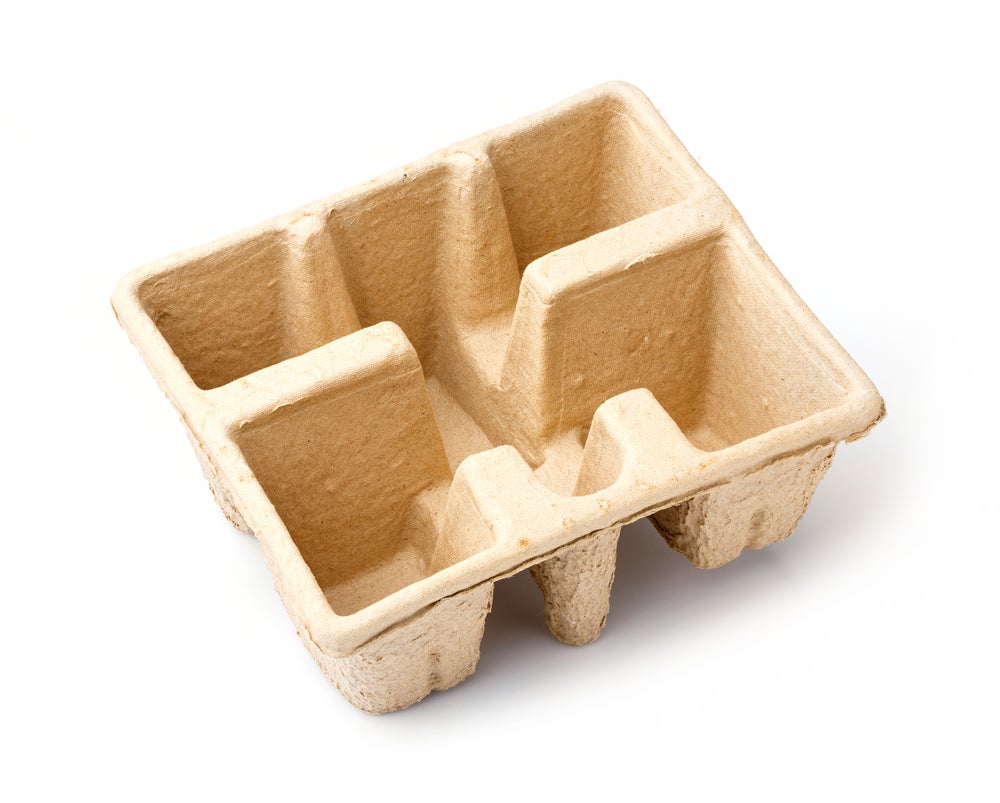
MCC Verstraete and Pagès Group have joined forces to showcase their Moulded Fibre Labelling (MFL) technology at Interpack 2023, featuring live demonstrations of the process of applying paper labels to round fibre-moulded tubs.
MCC Verstraete is a Belgian company specialising in offset-printing labels for injection moulding, blow moulding, and thermoforming on polypropylene and serves plastic packaging business clients.
Its partner, the Pagès Group, is a French company that offers automated production systems which include in-mould labelling, insert and over moulding.
Moulded fibre (also known as moulded pulp) is a packaging material, that is typically made from recycled paperboard or newsprint. It is used for protective packaging or for food service trays and beverage carriers.
During the upcoming international packaging fair in Dusseldorf, Pagès Group will be providing live demonstrations of its MFL application twice a day (11am and 4pm). It will have samples of labelled containers available for viewing. And experts from Pagès Group and MCC Verstraete will be sharing their knowledge about Moulded Fibre Labelling.
The term “in mould labelling” (IML) is directly derived from the technique and is a process where a printed label is put inside a mould that is the same shape as the final product, like a container for butter. Then, melted plastic material is poured into the mould and sticks to the label.
As the plastic cools and hardens, it takes the shape of the mould, and the label becomes a permanent part of the product.
Expanding applications of moulded fibre packaging
Moulded fibre packaging has been in use for a long time, mainly for protecting fragile items like eggs, trays, and electronics. The MFL label is a type of label made from paper that can stick really well to moulded fibre packaging. It can work with both dry and wet moulded fibre packaging.
As demand grows for eco-friendly and sustainable packaging, there’s a growing interest in using moulded fibre packaging for other types of products, such as fast-moving consumer goods.
This is possible due to advancements in barrier solutions that make the packaging more suitable for a wider range of applications.
Company highlights an eco-friendly solution for moulded fibre packaging
According to MCC Verstraete, MFL offers high-quality, strong, and hygienic labels that resist humidity and temperature fluctuations, adhere well to fibre material, and are environmentally-friendly.
MFL labels allow for quick design changeovers and offer a wide range of design options, the company added.
The MFL process can be integrated in-line or off-line, providing flexibility in the supply chain. Additionally, the MFL process can result in shorter production time and lower production costs.
Cost advantage of moulded fibre
Moulded fibre packaging is made from leftover or reused materials, which saves money right from the beginning of the packaging process. The packaging is custom-made to fit the client’s product, so there’s no need for extra work, which reduces labour costs.
Moulded fibre production costs are also lower because it’s not dependent on the gasoline industry. And because the packaging is compact and sturdy, it requires less space for shipping and storage, which cuts down on shipping costs.
Ramsey Baghdadi, consumer Analyst at GlobalData, comments: “In response to rising inflation, consumers are either spending less by buying less overall, switching out some products to save money, or buying higher quality produce to get better value for money.
“This is causing a polarisation in the market, with brands either increasing package sizes to appeal to bulk buyers or shrinking packs. Proving value for money will be key, with solutions such as larger pack sizes and reusable packaging expected to become more common.”




